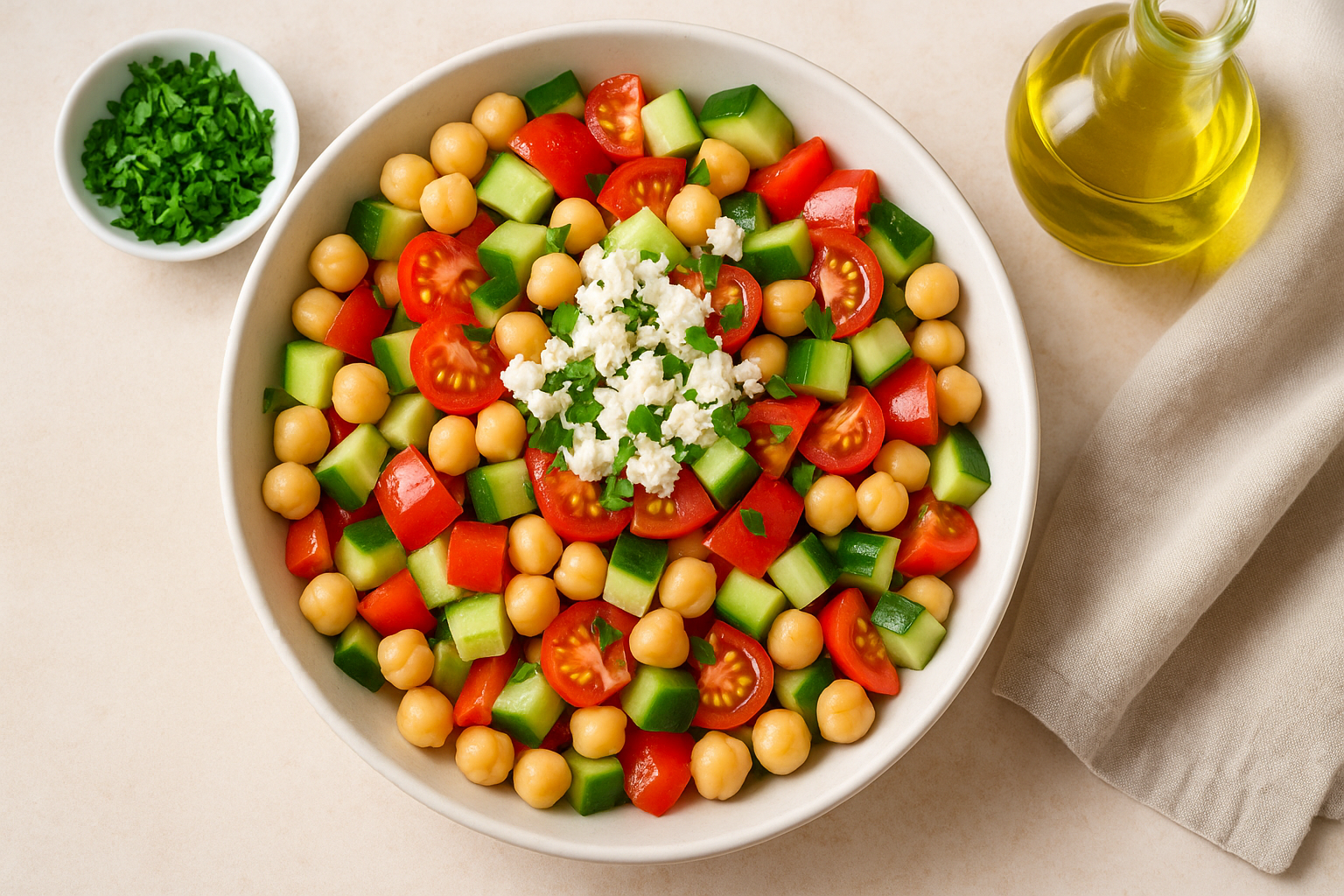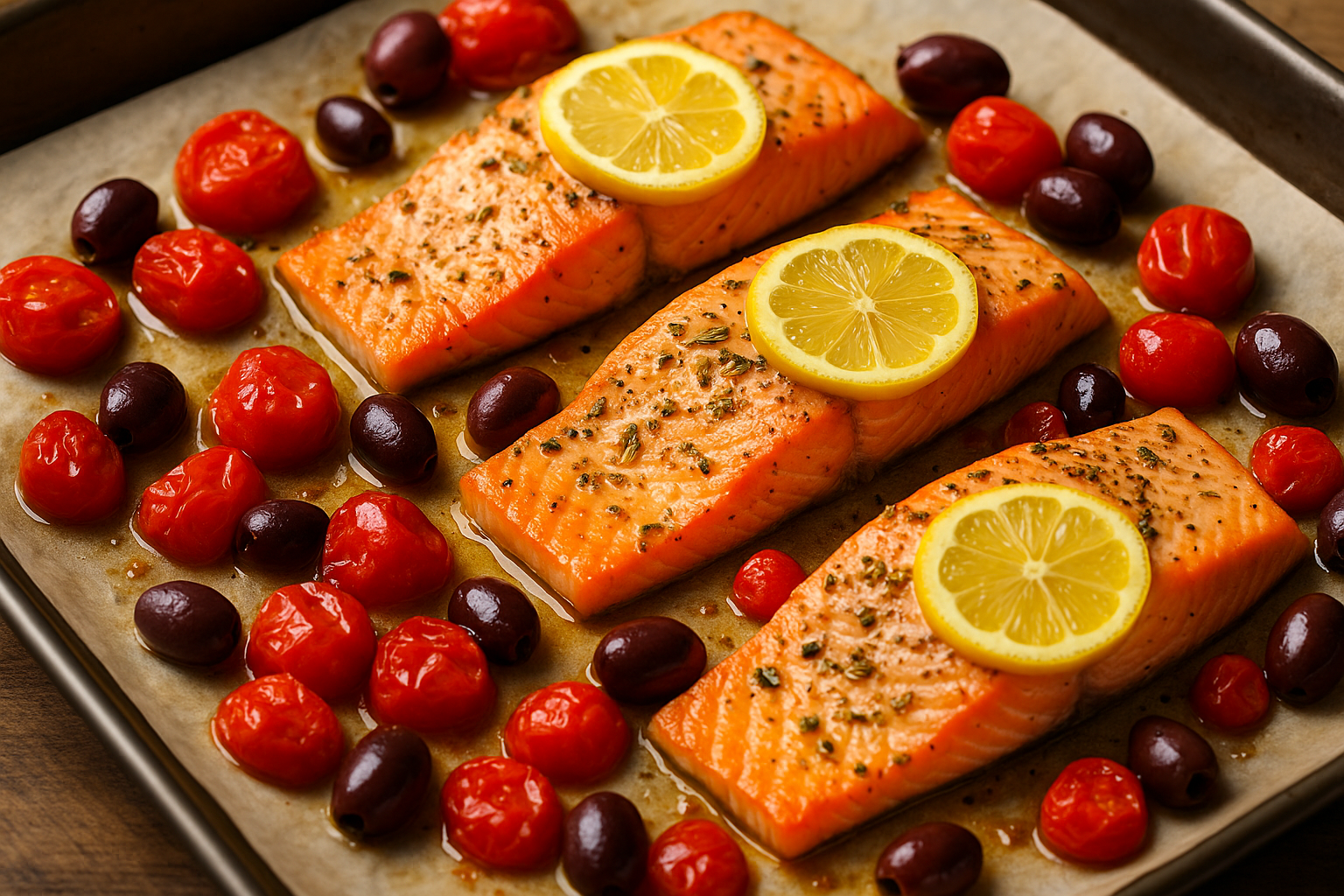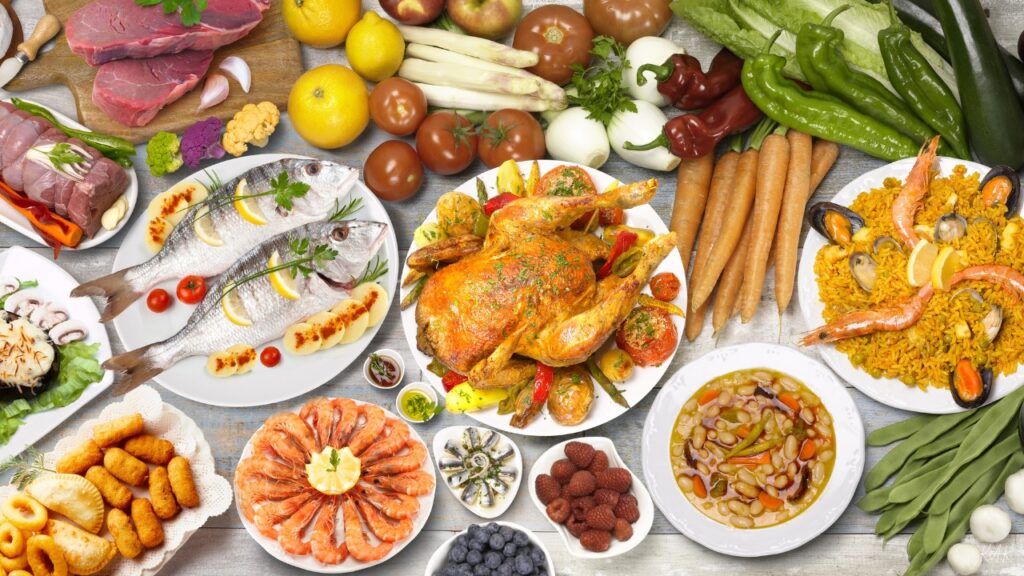The Mediterranean diet is often hailed as one of the healthiest eating patterns in the world. Rooted in the traditional cuisines of countries bordering the Mediterranean Sea, like Greece, Italy, and Spain, it emphasizes whole foods, fresh produce, lean proteins, and heart-healthy fats.
But beyond being good for you, Mediterranean diet recipes are flavorful, simple to prepare, and easy to adapt to modern lifestyles. In this guide, we’ll dive into what makes the Mediterranean diet so unique, explore the science-backed health benefits, and share practical recipes you can enjoy at home.
Caption: Fresh Mediterranean diet staples, including salmon, olive oil, chickpeas, grains, and vegetables.
What Is the Mediterranean Diet?
Unlike restrictive diets, the Mediterranean diet isn’t a rigid plan but a lifestyle rooted in balance. It focuses on:
- Fresh vegetables and fruits (tomatoes, leafy greens, olives, figs)
- Whole grains (barley, farro, oats, brown rice)
- Legumes and beans (chickpeas, lentils, black beans)
- Lean proteins (fish, seafood, and occasionally poultry)
- Healthy fats (olive oil, nuts, seeds, avocado)
- Moderate dairy (yogurt, cheese)
- Limited red meat and processed foods
Wine, particularly red wine, is consumed in moderation with meals in many Mediterranean cultures. The emphasis is not only on food but also on communal eating, active lifestyles, and mindful enjoyment.
Health Benefits of the Mediterranean Diet
Numerous studies confirm that following a Mediterranean-style eating pattern lowers the risk of chronic disease.
- Heart Health: Rich in omega-3 fatty acids and monounsaturated fats, it reduces cholesterol and improves circulation.
- Anti-Inflammatory Effects: Whole foods, fiber, and antioxidants help fight chronic inflammation.
- Weight Management: High fiber and nutrient density keep you fuller longer.
- Cognitive Function: Research links the Mediterranean diet to reduced risk of Alzheimer’s and cognitive decline.
- Longevity: Populations in Mediterranean regions consistently show longer lifespans.
Key Ingredients in Mediterranean Diet Recipes
To cook authentic Mediterranean dishes at home, stock your pantry with these staples:
- Extra Virgin Olive Oil: The cornerstone of Mediterranean cooking.
- Garlic and Herbs: Basil, oregano, rosemary, and thyme add flavor without extra salt.
- Seafood: Salmon, sardines, or cod, rich in omega-3s.
- Legumes: Chickpeas and lentils for protein-packed meals.
- Whole Grains: Couscous, quinoa, farro, and bulgur wheat.
- Fresh Produce: Tomatoes, zucchini, bell peppers, cucumbers, leafy greens.
- Nuts and Seeds: Almonds, walnuts, sunflower seeds, and sesame.
Mediterranean Diet Recipes You Can Try Today
Here are some easy-to-make recipes that highlight the flavors of the Mediterranean:
1. Greek Chickpea Salad
A refreshing plant-based dish perfect for lunch or as a side.
Ingredients:
- 1 can chickpeas, drained
- 1 cucumber, diced
- 1 red bell pepper, chopped
- ½ red onion, finely sliced
- ½ cup cherry tomatoes, halved
- ¼ cup crumbled feta cheese
- 2 tbsp extra virgin olive oil
- Juice of 1 lemon
- Fresh parsley, chopped
Instructions:
- Combine chickpeas, cucumber, pepper, onion, and tomatoes in a large bowl.
- Toss with olive oil, lemon juice, and parsley.
- Top with feta before serving.

Caption: Fresh Greek chickpea salad with cucumber, tomatoes, peppers, feta, and parsley.
2. Mediterranean Baked Salmon
Rich in omega-3s and bursting with flavor.
Ingredients:
- 4 salmon fillets
- 2 tbsp olive oil
- 2 cloves garlic, minced
- Juice of 1 lemon
- 1 tsp oregano
- Salt and pepper to taste
- Cherry tomatoes and olives for garnish
Instructions:
- Preheat oven to 375°F (190°C).
- Place salmon on a baking sheet lined with parchment.
- Mix olive oil, garlic, lemon juice, oregano, salt, and pepper. Brush over salmon.
- Scatter tomatoes and olives around the fish.
- Bake for 18–20 minutes until flaky.

Caption: Mediterranean baked salmon with lemon, cherry tomatoes, and olives.
3. Whole Grain Mediterranean Bowl
A hearty, customizable recipe great for meal prep.
Ingredients:
- 1 cup cooked quinoa or farro
- ½ cup roasted vegetables (zucchini, eggplant, bell peppers)
- ½ cup chickpeas
- ¼ avocado, sliced
- 2 tbsp hummus
- A drizzle of tahini
Instructions:
- Place grains at the bottom of a bowl.
- Top with roasted veggies, chickpeas, and avocado.
- Add hummus and a drizzle of tahini before serving.
Caption: Whole grain Mediterranean bowl with quinoa, roasted veggies, chickpeas, avocado, hummus, and tahini.
4. Classic Shakshuka (Eggs in Tomato Sauce)
A staple across the Mediterranean, perfect for breakfast or dinner.
Ingredients:
- 2 tbsp olive oil
- 1 onion, chopped
- 1 red bell pepper, chopped
- 2 cloves garlic, minced
- 1 can crushed tomatoes
- 1 tsp cumin, 1 tsp paprika
- 4 eggs
- Fresh parsley
Instructions:
- Heat olive oil in a skillet, sauté onion and bell pepper until soft.
- Add garlic, spices, and crushed tomatoes. Simmer 10 minutes.
- Make wells in the sauce and crack eggs into each. Cover and cook until whites are set.
- Garnish with parsley and serve with whole-grain bread.
Caption: Classic shakshuka with poached eggs in spiced tomato sauce, served with bread.
Tips for Cooking Mediterranean Recipes at Home
- Keep it simple: Focus on fresh, seasonal ingredients.
- Use olive oil as your main fat: Avoid heavy sauces or butter.
- Flavor with herbs, not salt: Mediterranean herbs add aroma and depth.
- Eat more plants: Make vegetables and legumes the star of your plate.
- Cook in batches: Prepare grain bowls, roasted veggies, and dips ahead of time for quick meals.
A Day on the Mediterranean Diet (Sample Menu)
Breakfast: Greek yogurt topped with walnuts, honey, and fresh berries.
Lunch: Chickpea salad with olive oil and lemon.
Snack: Handful of almonds and dried figs.
Dinner: Baked salmon with roasted vegetables and farro.
Dessert: Fresh fruit drizzled with a touch of honey.
Final Thoughts
The Mediterranean diet is not just about food—it’s about embracing a healthier, balanced way of living. By incorporating Mediterranean diet recipes into your weekly routine, you can enjoy flavorful meals while lowering your risk of chronic disease and improving overall well-being.
Whether you’re making a vibrant chickpea salad, a baked salmon dish, or a cozy shakshuka, the Mediterranean approach turns simple, whole ingredients into satisfying meals.
Also read: All About Skin Health Supplements: Your Complete Guide to Radiant Skin
